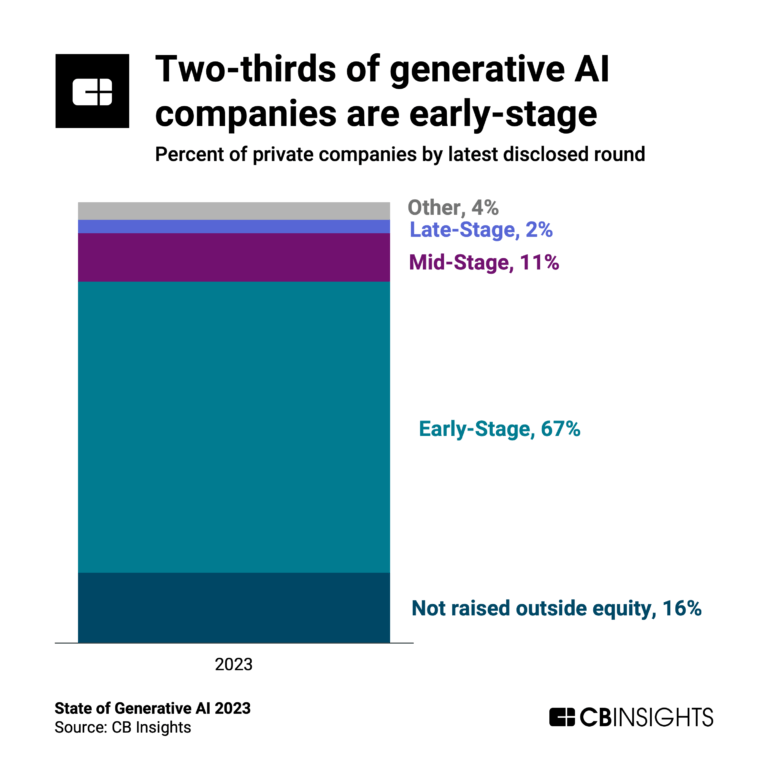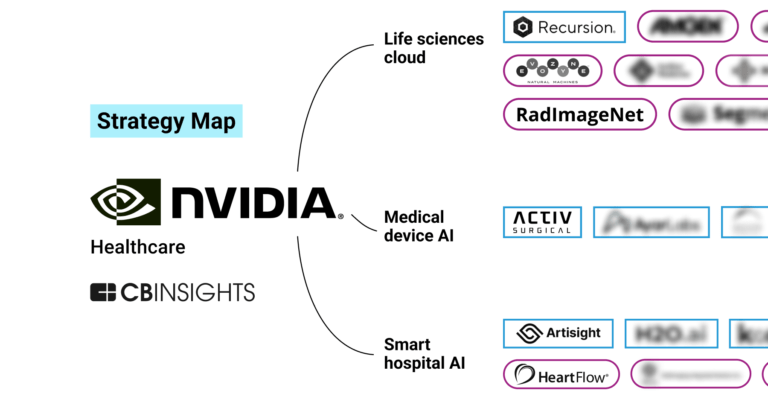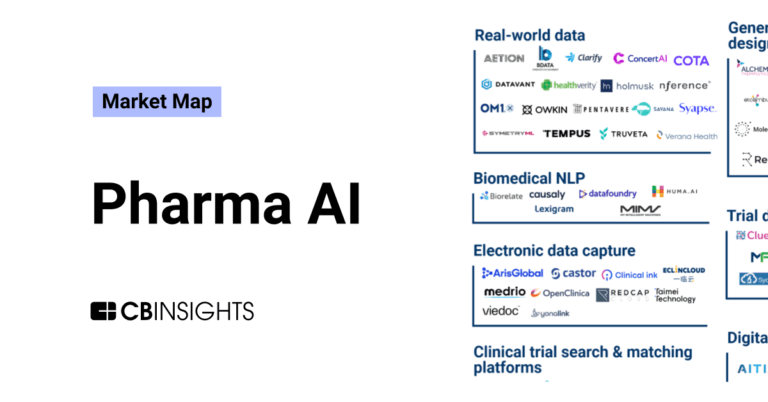
Generate Biomedicines
Founded Year
2018Stage
Unattributed VC | AliveTotal Raised
$708MMosaic Score The Mosaic Score is an algorithm that measures the overall financial health and market potential of private companies.
-1 points in the past 30 days
About Generate Biomedicines
Generate Biomedicines serves as a therapeutics company that operates at the intersection of machine learning, biological engineering, and medicine, focusing on pioneering generative biology to create breakthrough medicines. The company's main offerings include the development of novel medicines. Generate Biomedicines primarily serves the biopharmaceutical industry. It was founded in 2018 and is based in Somerville, Massachusetts.
Loading...
ESPs containing Generate Biomedicines
The ESP matrix leverages data and analyst insight to identify and rank leading companies in a given technology landscape.
The AI-derived biological drugs market leverages AI and machine learning to discover and develop novel biologic therapeutics, including proteins, nucleic acids, cells, and their combinations. These companies combine AI algorithms with experimental validation to engineer complex biological structures, optimize therapeutic properties, and enhance manufacturing processes for heat-sensitive and diffic…
Generate Biomedicines named as Leader among 15 other companies, including AbCellera, AbSci, and BigHat Biosciences.
Loading...
Research containing Generate Biomedicines
Get data-driven expert analysis from the CB Insights Intelligence Unit.
CB Insights Intelligence Analysts have mentioned Generate Biomedicines in 4 CB Insights research briefs, most recently on Feb 27, 2024.

Feb 27, 2024
The generative AI boom in 6 charts

Oct 25, 2023 report
State of Digital Health Q3’23 Report
Aug 29, 2023
The pharma AI market mapExpert Collections containing Generate Biomedicines
Expert Collections are analyst-curated lists that highlight the companies you need to know in the most important technology spaces.
Generate Biomedicines is included in 7 Expert Collections, including Unicorns- Billion Dollar Startups.
Unicorns- Billion Dollar Startups
1,261 items
Digital Health
11,328 items
The digital health collection includes vendors developing software, platforms, sensor & robotic hardware, health data infrastructure, and tech-enabled services in healthcare. The list excludes pureplay pharma/biopharma, sequencing instruments, gene editing, and assistive tech.
Drug Discovery Tech Market Map
221 items
This CB Insights Tech Market Map highlights 220 drug discovery companies that are addressing 12 distinct technology priorities that pharmaceutical companies face.
AI 100
100 items
Generative AI
1,298 items
Companies working on generative AI applications and infrastructure.
Artificial Intelligence
7,222 items
Generate Biomedicines Patents
Generate Biomedicines has filed 4 patents.
The 3 most popular patent topics include:
- animal viral diseases
- betacoronaviruses
- viral respiratory tract infections

Application Date | Grant Date | Title | Related Topics | Status |
|---|---|---|---|---|
5/5/2023 | 5/28/2024 | Betacoronaviruses, Virus families, Animal viral diseases, Viral respiratory tract infections, Zoonoses | Grant |
Application Date | 5/5/2023 |
|---|---|
Grant Date | 5/28/2024 |
Title | |
Related Topics | Betacoronaviruses, Virus families, Animal viral diseases, Viral respiratory tract infections, Zoonoses |
Status | Grant |
Latest Generate Biomedicines News
Feb 13, 2025
This field is for validation purposes and should be left unchanged. Today, a new artificial intelligence (AI)-driven biotech company emerges from stealth and it might not be the last time you hear its name. Latent Lab steps into the spotlight with a $40 million series A funding and a founder whose name might sound familiar – Simon Kohl. Indeed, Kohl was an important figure in the development of AlphaFold , DeepMind’s Nobel Prize-winning protein structure prediction tool. Backed by Radical Ventures, Sofinnova Partners, and Google chief scientist Jeff Dean, Latent Labs enters the competitive field of AI-assited drug discovery. While AlphaFold solved the challenge of protein structure prediction, it was never designed to create novel proteins from scratch. Latent Labs is now taking that next step – using generative AI to design therapeutic proteins. But Latent Labs is not alone in this space. Companies like Generate Biomedicines or Isomorphic Labs are also harnessing AI to engineer proteins for biotech applications. The question is: Can Latent Labs stand out in an increasingly competitive landscape? Table of contents From prediction to creation: What makes Latent Labs different? Understanding a protein’s structure is like solving a molecular puzzle – without knowing the shape, scientists are left guessing how drugs will fit. AlphaFold solved this problem by using AI to predict protein structures with near-experimental accuracy, dramatically accelerating early drug discovery. Traditionally, determining these structures required labor-intensive experimental methods. Many diseases are associated with malfunctioning proteins, and drugs often work by interacting with these proteins to modulate their activity. By predicting protein structures, AlphaFold enables researchers to identify potential binding sites for drugs, understand protein functions, and design molecules that can interact with these targets more effectively. Building upon this foundation, Latent Labs is advancing into de novo protein design – creating entirely new proteins that do not exist in nature. This allows for the development of proteins tailored to specific functions. Drug developers work with naturally occurring proteins, modifying them to enhance their therapeutic properties. However, this approach is limited – scientists are constrained by what evolution has already produced. De novo protein design changes that dynamic, allowing for the creation of entirely new proteins optimized for specific therapeutic needs, rather than repurposing existing ones. Creating new proteins like Latent Labs aims to do could expand drug targets as many diseases remain untreatable because natural proteins don’t provide the right molecular tools. It would allow targeting disease mechanisms that lack natural protein interactions, or overcome protein instability. The Competitive Landscape in AI Protein Engineering If you are following the biotech trends, you already know AI is getting more and more involved every step of the way in the industry – especially in drug discovery. It is fair to say Latent Labs isn’t alone on the market. But what are its competitors and how does it differentiate itself? Suggested Articles Isomorphic Labs Isomorphic Labs, a spin-off from DeepMind, is applying AI-first principles to drug discovery rather than just protein structure prediction. While its roots lie in AlphaFold, the company’s focus extends beyond structure determination – modeling how molecules interact to accelerate drug design. Unlike AlphaFold, which predicts static protein structures, Isomorphic Labs aims to understand how proteins, DNA, RNA, and small molecules dynamically interact within biological systems. The company’s approach has attracted major pharmaceutical partnerships. In 2024, Isomorphic Labs signed agreements with Eli Lilly and Novartis to apply its AI models in oncology and neurodegenerative disease research. Generate:Biomedicines Generate: Biomedicines’ proprietary platform, Chroma, is a generative model that creates new protein molecules based on geometric and functional programming instructions. Chroma can directly sample novel protein structures and sequences, enabling the design of proteins with specific desired properties and functions. In September 2024, Generate:Biomedicines entered into a multi-target collaboration with Novartis to discover and develop protein therapeutics. Under the terms of the agreement, Generate received an upfront payment of $65 million, which includes $15 million for the purchase of equity in the company. In addition to these collaborations, Generate also advances its proprietary platform. Cradle Bio Cradle focuses on AI-powered protein engineering, providing an interactive design platform that helps biologists optimize proteins for specific functions. Cradle primarily enhances and modifies existing proteins to improve stability, activity, and manufacturability. Scientists input a target protein sequence, and the AI model suggests modifications predicted to enhance its properties. Cradle does not develop its own therapeutic candidates. Instead, it operates as a platform provider, working with biotech and pharmaceutical companies to accelerate protein engineering. The company has secured partnerships with major industry players, including Novo Nordisk, Johnson & Johnson, Grifols, and Twist Biosciences, helping them refine and optimize proteins for various applications. One of Cradle’s notable achievements was its first-place in Adaptyv Bio’s protein design challenge. Using its AI-driven approach, Cradle engineered a novel EGFR-binding protein with a binding affinity of 1.21 nM – an eightfold improvement over Merck’s Cetuximab, a widely used cancer drug. In November 2024, Cradle also secured a $73 million series B funding round, bringing its total funding to over $100 million. How does Latent Labs fit in this picture? Unlike many companies in the space that use AI to optimize or repurpose existing proteins, Latent Labs designs entirely new proteins from scratch. This de novo approach enables the creation of proteins that nature has not yet evolved, unlocking new therapeutic possibilities. Indeed, Isomorphic Labs applies AI to drug discovery but still relies on natural proteins as its foundation. Similarly, Cradle enhances and optimizes proteins, helping researchers tweak their properties rather than generate new ones. Another significant difference that makes Latent Labs stand out is its business model. Instead of focusing on developing its own proprietary drug candidates, Latent Labs collaborates with various organizations, including biotech startups, research institutions, and pharmaceutical companies. Latent Labs operates on a partnership-driven model rather than the traditional biotech route of single-product development. By not restricting its technology to in-house projects or exclusive licensing deals, Latent Labs makes its AI tools more accessible to a broader range of partners. This inclusivity enables smaller biotech firms and academic institutions to utilize advanced AI-driven protein design without the need for substantial upfront investments or exclusive agreements. “Every biotechnology or pharmaceutical company wants to be at the forefront of technology to find the best therapeutic molecules, yet not all are in a position to develop the most advanced AI models for the job. That’s where Latent Labs comes in. We push the frontiers of generative biology, giving our partners instant access to tools that accelerate their drug design programs,” said Kohl in the press release. Latent Labs’ model is inherently scalable, allowing the company to engage with multiple partners across various sectors simultaneously. This flexibility not only diversifies their collaborative portfolio but also accelerates innovation across different fields by applying their AI technology to a wide array of biological challenges. This scalable platform could make de novo protein design more accessible than ever lowering the costs for smaller biotech companies. If successful, Latent Labs won’t just be another AI-driven biotech – it could reshape the way proteins are designed, making de novo protein engineering a foundational tool for drug discovery.
Generate Biomedicines Frequently Asked Questions (FAQ)
When was Generate Biomedicines founded?
Generate Biomedicines was founded in 2018.
Where is Generate Biomedicines's headquarters?
Generate Biomedicines's headquarters is located at 101 South Street, Somerville.
What is Generate Biomedicines's latest funding round?
Generate Biomedicines's latest funding round is Unattributed VC.
How much did Generate Biomedicines raise?
Generate Biomedicines raised a total of $708M.
Who are the investors of Generate Biomedicines?
Investors of Generate Biomedicines include Samsung Ventures, Novartis, Abu Dhabi Investment Authority, Morningside Venture Partners, Flagship Pioneering and 13 more.
Who are Generate Biomedicines's competitors?
Competitors of Generate Biomedicines include Antiverse and 3 more.
Loading...
Compare Generate Biomedicines to Competitors
Therapeutics Data Commons focuses on artificial intelligence for therapeutic science within the biomedical and pharmaceutical sectors. The company offers AI-solvable tasks, AI-ready datasets, and curated benchmarks to support the development and evaluation of AI methods in drug discovery and development. Therapeutics Data Commons primarily serves biochemical, biomedical, and machine learning scientists with resources for algorithmic and scientific advances in therapeutic applications. It was founded in 2021 and is based in Cambridge, Massachusetts.

LabGenius serves as a biopharmaceutical company that focuses on the discovery of medicines through the integration of machine learning, synthetic biology, and robotic automation. The company's main offerings include the development of therapeutic antibodies using a smart robotic platform, EVA, which designs and learns from its own experiments to improve the drug discovery process. LabGenius primarily serves sectors involved in the treatment of cancer and inflammatory diseases. It was founded in 2012 and is based in London, United Kingdom.

BigHat Biosciences focuses on the development of advanced antibody therapeutics within the biotechnology sector. The company offers a platform that combines machine learning and synthetic biology to accelerate the antibody engineering process, aiming to produce safer and more effective treatments. BigHat Biosciences primarily serves sectors that require therapeutic antibodies, such as the healthcare and pharmaceutical industries. It was founded in 2019 and is based in San Mateo, California.

Adimab provides biological discovery and engineering and focuses on antibodies and multispecifics. The company offers a proprietary yeast-based platform for the discovery and optimization of fully human monoclonal and bispecific antibodies, as well as the engineering of protein-based therapeutics. Adimab's services cater to pharmaceutical companies, biotechnology firms at various stages, and academic institutions seeking to develop quality therapeutic programs. It was founded in 2007 and is based in Lebanon, New Hampshire.

Insitro focuses on drug discovery and development. The company's main services involve the use of machine learning and throughput biology to predict successful paths for medicine creation. It aims to avoid costly failures in pharmaceutical research and development. Insitro primarily sells to the healthcare industry. It was founded in 2018 and is based in South San Francisco, California.

Molcure is a biotechnology company focused on accelerating drug discovery through the integration of AI-driven science and molecular engineering. The company offers a platform that combines machine learning, laboratory automation, and a proprietary database to generate diverse and high-quality antibodies and peptides. Molcure primarily serves the biopharmaceutical research sector, partnering with companies to discover therapeutics. It was founded in 2013 and is based in Kawasaki, Japan.
Loading...